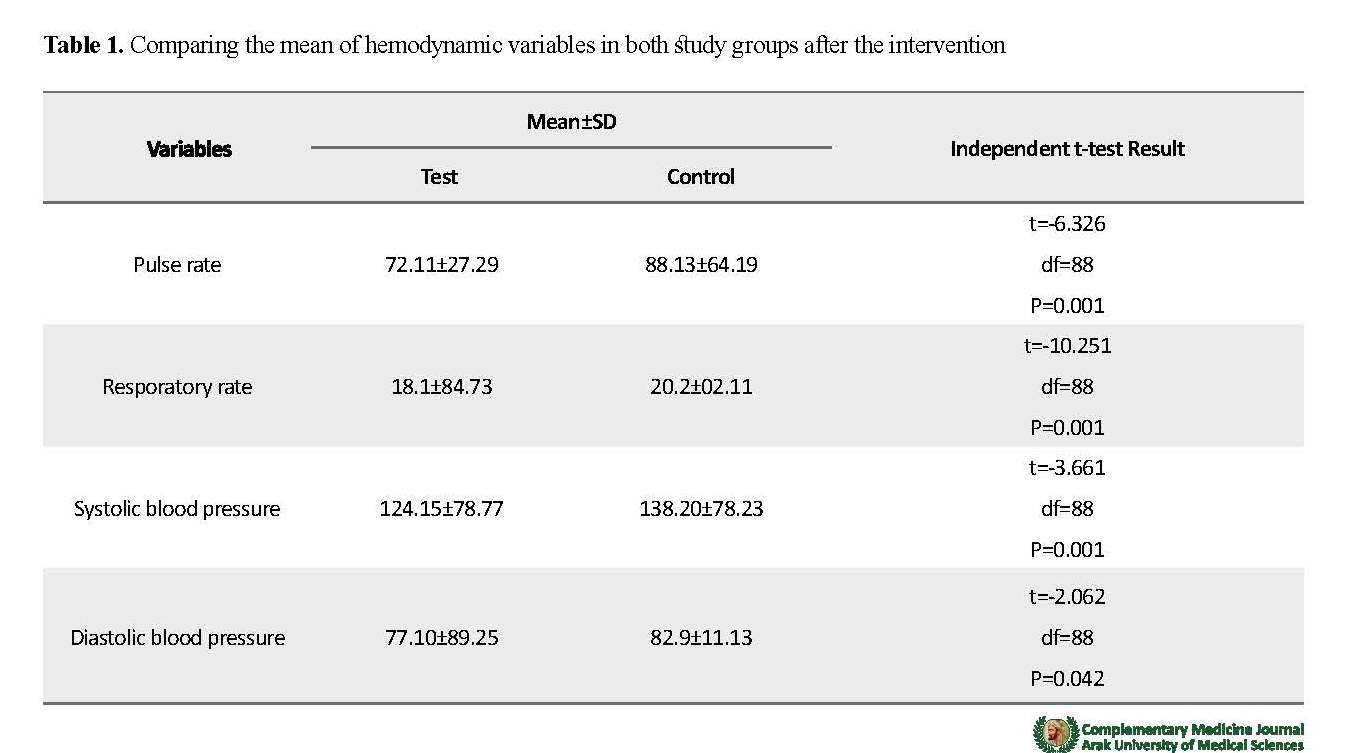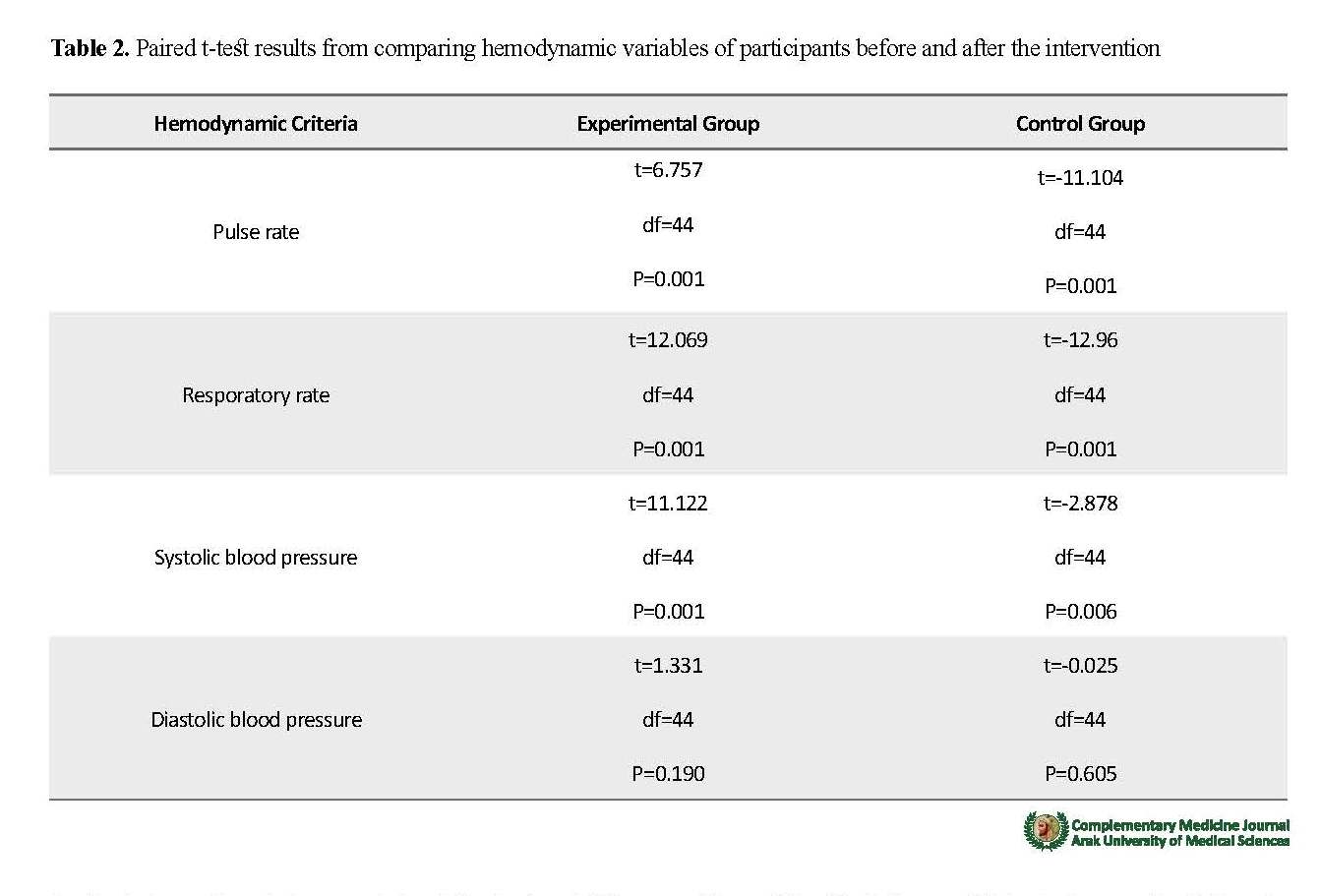Extended Abstract
1. Introduction
Cardiovascular disease is one of the leading causes of death, disability, and a decline in quality of life in the world, accounting for 50% of all deaths in developing countries. Open heart surgery is one of the most important methods in treatment of heart diseases associated with a decrease in patient mortality. In developing countries, the prevalence of cardiac surgery is 860 per one million and in developed countries it is 60 per one million. It is estimated that 93% of people who need cardiac surgery live in developing countries.
Preoperative anxiety before Coronary Artery Bypass Grafting (CABG) surgery is a risk factor for postoperative mortality. One of the important responsibilities of the nurses in the preoperative period is to maximize the physiological and mental health of the patient and help him/her to adapt to the current situation. In this regard, the tendency to use complementary medicine has increased because of its low cost, ease of use, and being uncomplicated.
Benson relaxation is one of the techniques of complementary medicine which is based on relaxation as a key element of meditation where four movements increase relaxation. Benson relaxation method affects the physiological symptoms of patients candidate for open heart surgery, especially in a military population.
2. Methods
This study is a clinical trial. The study population consisted of all men and women who were candidates for CABG surgery in one of the hospitals affiliated to AJA University of Medical Sciences in 2014. Considering 0.05 type I error and 80% test power, the sample size was calculated as 42 for each group. Given 10% sample drop, the sample size was determined 45 for each group (total =90). Samples were selected by convenience sampling technqiue and randomly assigned into two groups of test and control. Written informed consent was obtained from the particpants. Data collection tools included a demographic form and a form assessing vital signs (pulse rate, systolic blood pressure rate, diastolic blood pressure rate, and respiratory rate).
Particpants completed demographic form, and their vital signs were recorded in the evening before surgery. Then, Benson relaxation technique was taught to them. The patient repeated this intervention twice before surgery (the evening before surgery and the morning of surgery) in the presence of the researcher. The relaxation music was played for further influence. The control group did not receive any intervention. The second phase of patient evaluation (vital signs checking) was peformed in the morning of surgery, 30 minutes before surgery and after intervention.
The Mean±SD of age was 54.73±25.9 years in the experimental group and 56.91±5.90 years in control group. The results of the independent t-test showed no significant difference between the groups in terms of age (P=0.18). There was no significant difference between groups in terms of other demographic variables. Independent t-test results showed no significant difference between the groups in terms of physiological symptoms before the intervention, but there was a significant difference in all symptoms after the intervention (Table 1). Paired t-test results reported a significant difference between the two groups before and after the intervention in terms of physiological variables except for diastolic blood pressure (Table 2).

This study was conducted to evaluate the effect of Benson relaxation technqiue on the physiological symptoms of patients candidates for CABG surgery. According to the results of this study, Benson relaxation had a significant positive effect on decreasing the physiological parameters that make patients relaxed. In fact, Benson relaxation creats a balance between the anterior and posterior parts of the hypothalamus, decreases sympathetic system activity, releases catecholamines, reduces muscle spasms, and cardiac activity, and regulates breathing. Slower breathing patterns have a beneficial effect on heart rate and respiratory sinus arrhythmia, due to a relaxation that reduces sympathetic system activity and increases parasympathetic activity by decreasing metabolic energy requirement and autonomic system balance.

Considering the importance of relaxation in patients undergoing CABG surgery, and given that the use of complementary therapies can affects patients without complications, it is recommended that this technique should be used to relax patients undergoing CABG surgery and control their physiological conditions.
One of the limitations of this study was the failure to blind the researcher to the results of study groups because the researcher had undergone the Benson relaxation training and could not allow other researcher to perform sampling; hence, it is recommended to consider this limitation in future studies. In our study, only the one who was responsinle for the statistical analysis was blind to the groups. Future studies are suggested to evaluate the effect of this intervention on the stress and physiological symptoms of patients after CABG surgery.
Ethical Considerations
Compliance with ethical guidelines
This study was approved by the Research Ethics Committee of AJA University of Medical Sciences (code: 9319). It is also a registered clinical trial ( code: IRCT2014121520328N1). In this study, written informed consent was obtained from patients. Ethical Principles were according to The Declaration of Helsinki .
Funding
This paper was extracted from a research proposal approved by Aja University of Medical Sciences (code: 592163). The study received financial support from this university.
Authors' contributions
Conceptualization by Fatemeh Teimori, Seyed Amirhossein Pishgooie, and Mehdi Malmir; methodology by Fatemeh Teimori and Seyed Amirhossein Pishgooie; investigation: Fatemeh Teimori, Mehdi Malmir; Writing-original draft by Nahid Rajai; Writing-review & editing by all authors; supervision by Fatemeh Teimori.
Conflicts of interest
The authors declared no conflict of interests.
Acknowledgements
The authors would like to thank the Aja University of Medical Sciences for their support.
